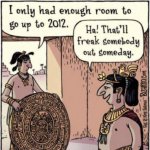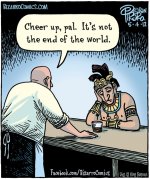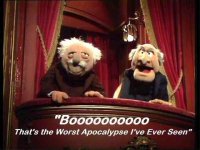I'm sure everyone has heard about the supposed 'apocalypse' that's going to happen a week from today. We have all been hearing about it for years and years.
I don't believe it's going to happen. I don't think 'the end of the world' can be predicted down to a certain date and time. But alot of people do believe it's going to happen. I know people that have been planning for quite awhile and have stocked up on food,water,weapons,etc. I know of churches that have stocked up on caskets(but if the world is going to end, who will bury them?haha). I even know people that believe there's going to be a 'zombie apocalypse' and have been preparing for that.
I do believe something will happen, but most likely it's going to be people doing really stupid things because they will believe they have nothing to lose. I think alot of people will be getting arrested for doing something stupid during an 'end of the world' party(which, by the way, there's alot of those planned, and I have been invited to one).
I'm just curious what others think/believe......
I don't believe it's going to happen. I don't think 'the end of the world' can be predicted down to a certain date and time. But alot of people do believe it's going to happen. I know people that have been planning for quite awhile and have stocked up on food,water,weapons,etc. I know of churches that have stocked up on caskets(but if the world is going to end, who will bury them?haha). I even know people that believe there's going to be a 'zombie apocalypse' and have been preparing for that.
I do believe something will happen, but most likely it's going to be people doing really stupid things because they will believe they have nothing to lose. I think alot of people will be getting arrested for doing something stupid during an 'end of the world' party(which, by the way, there's alot of those planned, and I have been invited to one).
I'm just curious what others think/believe......






